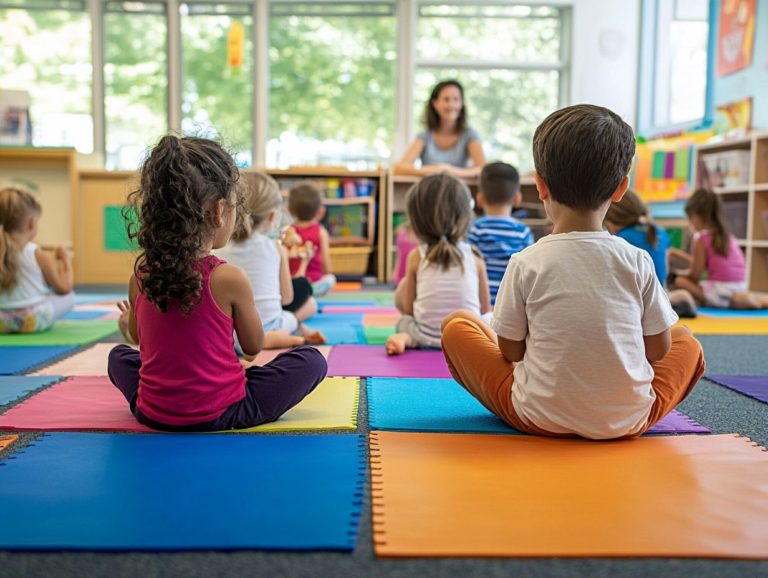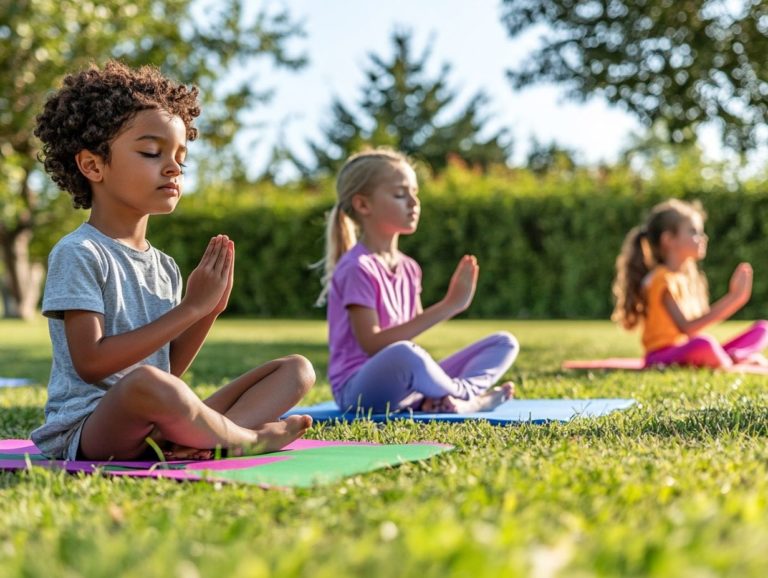Integrating Mindfulness into Parenting Discussions
Parenting is an extraordinary journey, brimming with both joy and challenges. Incorporating mindfulness and awareness practices can truly elevate your experience.
By embracing mindfulness, you have the opportunity to forge a deeper connection with your children, alleviate parental stress, and cultivate a nurturing environment that benefits everyone.
This article delves into the importance of mindful parenting, highlighting its myriad benefits. It also offers practical techniques that seamlessly fit into your daily routines and parenting interactions.
From mindful breathing exercises to engaging activities designed for your children, discover how these mindful practices can revolutionize your parenting and enhance your family’s overall well-being.
Contents
- Key Takeaways:
- Why is Mindfulness Important in Parenting?
- How Can Parents Incorporate Mindfulness into Their Daily Routine?
- Embrace Mindfulness to Transform Your Parenting Journey!
- How Can Mindfulness Help with Parenting Challenges?
- Mindful Parenting Techniques You Can Try
- How Can Parents Introduce Mindfulness to their Children?
- Frequently Asked Questions
- 1. What does it mean to integrate mindfulness into parenting discussions?
- 2. How can mindfulness benefit parents in their discussions with their children?
- 3. Are there any specific mindfulness techniques that can be used in parenting discussions?
- 4. How can parents incorporate mindfulness into daily conversations with their children?
- 5. Can mindfulness help in resolving conflicts during parenting discussions?
- 6. Is it important for both parents to practice mindfulness in order to have effective parenting discussions?
Key Takeaways:

- Incorporating mindfulness into parenting can have numerous benefits, including improved communication, reduced parental stress and anxiety, and cultivating patience and empathy.
- Parents can easily include mindfulness in their daily routine through simple practices such as mindful breathing, listening, and discipline. Implementing mindful techniques during mealtimes, playtime, family routines, and bedtime is also beneficial.
- Introducing mindfulness to children can be done by leading by example, making it fun and engaging, and encouraging mindful activities. This can have a positive impact on their well-being and development.
Why is Mindfulness Important in Parenting?
Mindfulness plays a vital role in parenting as it nurtures the ability to manage your emotions, strengthens parent-child relationships, and promotes good mental health for both parents and children, leading to healthy development.
In today s fast-paced environment, parenting can feel overwhelming. Embracing mindfulness originally rooted in Buddhism equips you with essential tools to slow down and engage more deeply with your children.
This practice helps you develop reflective parenting skills that are crucial in the 21st-century parenting landscape. The practice of nonjudgmental acceptance fosters improved parent-child interactions and cultivates deeper connections within your family.
What are the Benefits of Mindful Parenting?
Mindful parenting brings a wealth of benefits, including heightened emotional awareness, improved self-regulation, and the cultivation of positive parenting skills. These skills foster healthier relationships with your child.
By weaving mindfulness into your daily interactions, you become more attuned to your child’s needs. This creates an atmosphere of compassionate parenting that nurtures resilience and emotional intelligence.
This practice can also help in addressing beliefs and biases that may affect your parenting dynamics. It not only helps you reduce stress, allowing you to maintain a calm demeanor during challenging moments, but it also serves as a powerful example for your children regarding emotional regulation.
For instance, when you take a moment to practice deep breathing before responding to a child’s tantrum, you model effective coping strategies they can learn from.
Consistent mindfulness practices significantly strengthen family bonds. By regularly setting aside time for mindful activities like family walks or meditation, you promote connection and open communication.
As you grow more aware of your own emotions, you naturally learn to empathize with your children, leading to a deeper sense of trust and understanding within your family unit. Engaging in home visiting programs can further support these efforts by providing external community support.
How Can Parents Incorporate Mindfulness into Their Daily Routine?
Incorporating mindfulness into your daily routines can profoundly elevate the quality of your parenting interactions. By cultivating a calm state of awareness, you create an environment that benefits both you and your children.
Engaging in techniques such as mindful pre-sleep rituals, gratitude journaling, and tailored mindfulness exercises not only promotes emotional regulation but also deepens family connections.
Mindfulness training and attention to self through these practices ensure that each moment is fully appreciated and embraced, enhancing the richness of your shared experiences.
1. Practice Mindful Breathing
Practicing mindful breathing is a simple yet transformative technique that enables you to develop a calm mind. It significantly impacts your parenting style. By taking a moment to breathe deeply and focus on your breath, you can ground yourself and reduce stress. This helps you engage with your children with greater patience and clarity.
This method can also assist in managing your internal thinking mechanisms and sensory experiences. It typically involves inhaling slowly through your nose, allowing your diaphragm to expand, and then exhaling gently through your mouth.
Doing this practice not only alleviates immediate tension but also fosters emotional awareness. This allows you to tune in to your feelings and reactions. As you become more attuned to your inner state, you ll find it easier to manage your responses during challenging moments.
This creates a more harmonious family environment. These techniques can also improve self-regulation, enabling you to interact more mindfully. This enhances both your relationship with your child and your overall emotional well-being.
2. Practice Mindful Listening
Mindful listening means fully engaging with your child during conversations. It involves giving them your undivided attention and fostering deeper connections through interactive engagement. This practice enhances emotional awareness for both you and your child, encouraging open and honest communication.
To practice mindful listening effectively, you can adopt techniques such as maintaining eye contact and pausing to allow them time to process their thoughts. You can also reflect back what your child says to show you are listening. This approach creates a safe atmosphere where children feel heard and valued.
Giving your child your full attention strengthens the parent-child relationship. When you model attentive listening, you demonstrate the importance of empathy and respect. Over time, these interactions can transform your relationship with your child.
This leads to increased trust and a greater willingness to express feelings openly. It fosters a healthier emotional climate within your family.
3. Practice Gratitude

Practicing gratitude through techniques like gratitude journaling can transform your emotional state. By reflecting on what you appreciate about your children, you create a positive parenting environment.
Incorporating gratitude into your daily life fosters emotional awareness. It also strengthens family dynamics by encouraging open communication and empathy. Try sharing highlights of your day during dinner it can work wonders! You can also create a gratitude jar where family members can drop notes of appreciation for one another.
These habits help you recognize the small joys amid your hectic routine. They teach your children the value of appreciating what they have.
This exchange builds a stronger bond between family members. It leads to a more harmonious household where everyone feels valued and understood.
By incorporating these mindful techniques into your daily life, you can create a nurturing and supportive environment for your children. Start your journey to mindful parenting today!
Embrace Mindfulness to Transform Your Parenting Journey!
Mindful discipline is an approach that emphasizes understanding and compassion over punishment. This enables you to impart valuable lessons while maintaining emotional balance. By responding thoughtfully to your child’s behavior, rather than reacting impulsively, you foster better self-regulation and healthier relationships with your children. This approach aligns with the principles of positive parenting.
By prioritizing empathy and patience, mindful discipline helps you create a nurturing environment where your children feel safe to express their emotions. This method acknowledges that a child’s misbehavior often arises from unmet needs or emotional distress, rather than intentional wrongdoing. Techniques that help you focus on the present moment can also effectively address these needs.
You can adopt strategies such as:
- Engaging in active listening, where you fully immerse yourself in your child’s feelings.
- Consistently setting clear boundaries, which provides a sense of predictability.
Incorporating moments of calm reflection like taking deep breaths before responding allows you to approach situations with a balanced mindset. This ultimately leads to more constructive conversations and positive parenting outcomes.
How Can Mindfulness Help with Parenting Challenges?
Mindfulness is an invaluable resource for tackling a multitude of parenting challenges. It aids in reducing stress, regulating emotions, and enhancing your overall parenting skills. Introducing techniques that help you focus on the present can further support these efforts.
By embracing a mindful approach, you can face daily difficulties with increased composure and clarity. This not only leads to better decision-making but also cultivates healthier interactions with your children.
1. Managing Stress and Anxiety
Managing stress and anxiety through mindfulness practices can significantly enhance your emotional awareness and resilience as a parent. This ultimately leads to healthier family dynamics. Techniques like mindful breathing and reflective thinking invite you to pause, assess your emotions, and respond to stressful situations with a calm and clear mindset.
By incorporating simple mindfulness exercises into your daily routine, you cultivate a greater sense of presence and awareness of your thoughts. This not only enhances your mental well-being but also fosters a nurturing atmosphere for your children. For instance, dedicating just a few moments each day to practice deep breathing techniques allows you to center yourself before engaging with your kids.
Setting aside time for reflective thinking at the end of the day encourages a positive mindset. It enables you to process your experiences and emotions constructively. These mindful actions not only alleviate your stress but also serve as a powerful example of healthy emotional management for your children. This equips them with valuable skills that will support their own emotional development.
2. Improving Communication with Children
Improving communication with children through mindfulness practices can significantly elevate your parenting interactions. It fosters a deeper understanding between you and your child. By being fully present during conversations, you can listen actively and respond thoughtfully. This creates an environment that encourages open dialogue and emotional safety, thus meeting your child s needs more effectively.
This mindful presence enables you to recognize non-verbal cues, such as facial expressions and gestures, which are vital in grasping your child’s feelings. Techniques like pausing before responding allow you to gather your thoughts. This ensures that your replies are measured and compassionate, rather than reactive.
Asking open-ended questions invites your child to express themselves more freely, nurturing richer conversations. Instead of simply asking, “How was your day?” consider saying, “What was the most exciting part of your day?” This approach deepens your connection and imparts essential communication skills to your child, setting the stage for meaningful exchanges now and in the future.
3. Cultivating Patience and Empathy
Cultivating patience and empathy through mindfulness practices enables you to respond to your child’s needs with genuine compassion and understanding. By weaving mindfulness into the fabric of your daily life, you can develop essential skills that promote a calming presence. This allows you to meet your child’s needs more effectively and nurture a supportive family environment.
This nurturing approach encourages you to pause before reacting. This creates a precious moment to observe your child’s emotions with an open heart. Techniques like deep breathing, meditation, or mindful walking practices become your invaluable tools, helping you stay aware and calm during busy times.
Engaging in active listening during conversations deepens your connection and grants you insight into your child’s inner world. Practicing gratitude daily shifts your focus from frustration to appreciation, enriching the bond you share with your child. These practices also pave the way for better mental activity and emotional regulation.
By intentionally carving out time for these mindful moments, you not only enhance your own emotional resilience. You also model empathy and patience. In doing so, you guide your child toward becoming an emotionally intelligent individual, equipped to navigate the complexities of life and develop healthier thought patterns.
Mindful Parenting Techniques You Can Try

Mindful parenting techniques often draw on principles from Buddhism, promoting a mindful approach to everyday parenting.
These techniques involve a range of practices aimed at enhancing your emotional intelligence and promoting reflective parenting. Ultimately, these practices elevate the dynamics within your family.
They encourage you to engage intentionally with your children, fostering deeper connections and a greater understanding in various parenting situations.
1. Mindful Eating
Mindful eating invites you to slow down and fully immerse yourself in the sensory experiences that food offers. This fosters a healthier relationship with eating. This approach not only enhances your enjoyment of meals but also sharpens your awareness of hunger and fullness cues. It paves the way for better eating habits in children. Dr. Jon Kabat-Zinn has been a strong advocate for mindful eating, linking it to overall well-being.
By embracing this practice, you can cultivate a nurturing environment where food is not merely consumed but truly celebrated. This creates a fun and engaging way to enjoy balanced nutrition together! To weave mindful eating into your daily routine, consider designating meal times as tech-free zones, allowing for uninterrupted conversations and meaningful connections.
Involving your children in meal preparation will ignite their curiosity about flavors and textures while imparting valuable cooking skills. Encouraging pauses between bites opens up opportunities for reflection on how food makes everyone feel. This practice ultimately helps children develop healthier attitudes toward eating, transforming mealtime into a more enriching experience. As highlighted in The Dear Apparently Parent podcast, mindful eating can be a cornerstone of healthy family dynamics.
2. Mindful Playtime
Mindful playtime means fully immersing yourself in play activities with your child. This creates an interactive experience that satisfies their need for attention and connection. This approach not only elevates the quality of play but also nurtures emotional awareness, reinforcing the bond between you and your child. Programs like the Strengthening Families Program emphasize the importance of such mindful interactions.
By intentionally engaging in activities that blend focus with creativity, you can cultivate an environment that encourages your child to explore their feelings and thoughts. Simple endeavors, like building a fort together or molding clay, can become rich opportunities for mindfulness. While constructing a fort, for example, you might ask open-ended questions about your child s design choices, inviting them to share their creativity.
When working with clay, you can both delve into discussions about textures and colors, enhancing sensory awareness. These thoughtfully structured moments of play do more than just entertain; they foster a deeper emotional connection and understanding between you and your child.
3. Mindful Bedtime Routine
A mindful bedtime routine enhances your child’s emotional state and promotes restful sleep. By incorporating reflective thinking and calming practices like reading or gentle conversations, you can create a nurturing environment that encourages relaxation and emotional well-being.
This intentional approach helps your child wind down from their busy day and fosters a sense of security and closeness between you both. Creating a consistent pattern like dimming the lights, playing soft music, or guiding your little one through mindfulness exercises makes the transition to sleep much smoother.
These practices tell your body it s time to relax and prepare for a peaceful night s sleep. When you engage in this soothing routine alongside your child, you also savor your own moments of tranquility, enhancing overall family harmony.
How Can Parents Introduce Mindfulness to their Children?
Mindfulness is an invaluable gift that nurtures emotional regulation, self-awareness, and resilience in children, providing them with essential skills for healthy development. Techniques like Mindful Awareness Parenting (MAP) can be particularly effective in this regard.
By engaging in mindful activities together, you can model these practices, creating a supportive family environment where mindful parenting seamlessly integrates into family life.
1. Lead by Example
Leading by example is an incredibly effective way to introduce mindfulness to your children. You showcase the significance of self-regulation and emotional awareness in everyday interactions. By actively practicing mindfulness yourself, you inspire your children to embrace these invaluable techniques.
Incorporating mindfulness rituals into your daily routines can yield remarkable results. Consider setting aside time for family meditation or engaging in deep breathing exercises during particularly stressful moments this creates a serene atmosphere that everyone benefits from.
Engaging in mindful listening during conversations not only models attention and respect but also encourages your children to express themselves without hesitation. Seize everyday opportunities, like savoring a meal together or enjoying a mindful walk in nature, to reinforce this practice.
These approaches illustrate how cultivating mindful habits can elevate overall well-being. When your children observe you embracing these practices, they are more likely to internalize these principles, fostering a more mindful family dynamic.
2. Make it Fun and Engaging

Making mindfulness both fun and engaging captures children’s interest, encouraging them to integrate these practices into their daily lives. By utilizing playful mindfulness activities that incorporate sensory experiences, you transform the learning process into an enjoyable and relatable adventure for kids.
For instance, consider organizing a nature treasure hunt that allows children to explore their surroundings while honing their observation skills and fostering gratitude. Another delightful option is mindful coloring, where they express their emotions through colors, thus enhancing their creativity.
You might even introduce simple breathing exercises by having them pretend to blow up a balloon, adding a dynamic and relatable twist to the practice. These activities promote self-awareness and cultivate a sense of calm and presence, helping children establish a meaningful connection with the world around them.
In conclusion, introducing mindfulness to your children enhances their emotional well-being and strengthens family bonds. Start your mindful journey together today!
3. Encourage Mindful Activities
Encouraging mindful activities not only reinforces the principles of mindfulness but also enhances your child’s emotional awareness and self-regulation skills, which is the ability to manage one’s emotions and behavior. You can introduce a variety of awareness practices, such as mindful walking or nature exploration, to cultivate a nurturing environment that promotes healthy emotional development.
Integrate activities like deep breathing exercises and guided imagery to enable your child to connect meaningfully with their emotions and thoughts, helping them recognize feelings in a constructive manner. Consider following resources like The Dear Apparently Parent podcast for more practical tips.
Simple techniques, such as setting aside a few moments each day for gratitude practice or maintaining a feelings journal, can seamlessly fit into your daily routine, making mindfulness a natural part of life. Programs like the Strengthening Families Program can also provide structured activities to enhance family mindfulness practice.
You can also create mindful moments during meals by encouraging discussions about flavors and feelings, promoting attentive eating habits that further enhance awareness. These practices not only support emotional intelligence but also deepen the bond between you and your child through shared experiences. Ideas from experts like Dr. Jon Kabat-Zinn can offer valuable insights on integrating mindfulness practices for new parents into daily routines.
Watch this video for more insights on integrating mindfulness into parenting!
Frequently Asked Questions
1. What does it mean to integrate mindfulness into parenting discussions?
Integrating mindfulness into parenting discussions refers to incorporating techniques and practices of mindfulness into conversations and interactions with your children. It involves being present and aware in the moment and using mindful communication to effectively connect with your child.
2. How can mindfulness benefit parents in their discussions with their children?
Mindfulness can benefit parents by helping them become more aware of their own emotions, thoughts, and reactions. This increased awareness can lead to more calm and effective communication with their children, resulting in better understanding and connection. Utilizing strategies from the parenting MAP can further enhance these discussions.
3. Are there any specific mindfulness techniques that can be used in parenting discussions?
Absolutely! There are various techniques and practices that can be integrated into parenting discussions, such as mindful breathing, body scan, and mindful listening. These techniques can help parents stay present, manage their emotions, and communicate more effectively with their children. Drawing from resources like parenting MAP can provide structured approaches to implementing these techniques.
4. How can parents incorporate mindfulness into daily conversations with their children?
Parents can incorporate mindfulness into their daily conversations with their children by actively listening and being fully present in the conversation, using non-judgmental language, and taking pauses to be aware of their own emotions and thoughts.
5. Can mindfulness help in resolving conflicts during parenting discussions?
Yes! Mindfulness can be a game-changer in resolving conflicts during parenting discussions. It can help parents stay calm and non-reactive, listen to their child’s perspective, and respond with empathy and understanding. The Strengthening Families Program offers conflict resolution strategies that align well with mindfulness practices.
6. Is it important for both parents to practice mindfulness in order to have effective parenting discussions?
While it is ideal for both parents to practice mindfulness, even if only one parent is incorporating mindfulness into discussions, it can still have a positive impact on the overall communication and relationship with their child. However, both parents practicing mindfulness can lead to better harmony and understanding in the household.
The teachings of Dr. Jon Kabat-Zinn emphasize the collective benefits of shared mindfulness practice within families.






